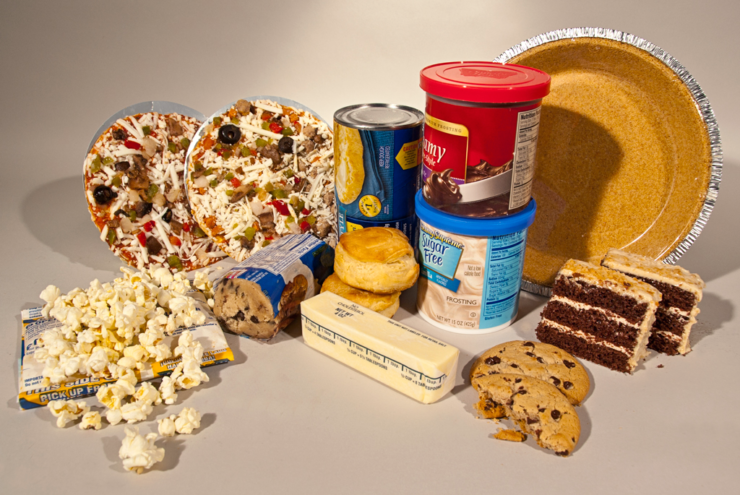The national ban on trans fats will come into effect on September 15, 2018. Trans fats are typically added to foods to increase their shelf life, and can have various negative side effects.
The trans fat ban is effective health policy
Claire Bernard
Trans fats can come in small doses in foods like beef and lamb, however, they can also be synthetically produced. Synthetic trans fats are used to increase the shelf life and taste of products like baked goods and cooking oils. This temporary enhancement of the taste has some negative impacts on the health of our community, so the government’s trans fat ban is a welcome approach to public health.
An abundance of trans fat can have many negative side effects on a person’s health—raising cholesterol, increasing the risk of coronary heart disease, diabetes, and Alzheimer’s. Implementing a ban on the use of trans fats will reduce the burden these effects have on our healthcare system, and make for a healthier society.
If, after seeing the disadvantages of trans fats, you see this as the government trying to take away your freedom to choose what you eat, consider examples of other consumption limits—the ban on smoking in public and the legal blood alcohol concentration in Canada were both instituted to improve the health and safety of Canadians.
Will banning trans fats be effective? Canadian history says yes. Nearly 30 years ago, Canada had some of the largest trans fat consumption rates in the world. In the 2000s, labelling requirements and the implementation of a maximum level of trans fats helped to lower consumption rates. There is still room for improvement and implementing a ban will ensure Canadians’ intake of trans fats will be even lower.
This new ban is really about preventing companies from introducing extra, unwanted chemicals into your favourite foods. Manufacturers that disagree with these new regulations are less likely to be interested in your health and most likely interested in making money since trans fats are used to extend the shelf life of their products. Risking our population’s health in favour of economic gains is not very appetizing.
In the end, it depends where your priorities lie: with a small manufacturing limitation or a much greater increase in nutritious lifestyle choices? Choose wisely.
Ban on trans fat won’t accomplish much
Everett Ekehew
It comes as no surprise that the newest legislative foray into Canadians’ diets is an enormous blunder, considering the long and greasy history of fat politics.
Beginning in the early 20th century, saturated fats, found in highest concentrations in animal products and some vegetable oils, were found to negatively impact coronary health. Organizations with “your best interests at heart,” recommended replacing saturated fats with trans fats, and technology graciously came to the rescue by hydrogenating vegetable oil. Through this fancy process, commercial trans fats were born.
These highly-processed fats were great for improving the shelf life of granola bars or making crackers a better shade of grease, but weren’t great for humans, whose bodies couldn’t handle these Frankenlipids. In large part, trans fats gave birth to processed food as we know it today—food items from Oreos to Big Macs were all made possible by this new, cheap, resilient, and poisonous oil.
It is no mistake to attribute to the rise of partially hydrogenated oils (PHOs), with the razing of the rainforest for palm plantations or the enormous CO2 output that results from manufacturing plastic food wrappers and then shipping them to the other side of the world. The environmental side effects are just as damaging as the personal health side effects.
Obviously, PHOs are bad so this ban is good, right?
While the health benefits of the issue are hard to dispute, this trans fat ban misses the mark completely Other than giving the government some good publicity, it will have no consequence beyond annoying corporate food producers.
This is because the ban does absolutely nothing to address the legacy of the government’s last big campaign against fat. This campaign demonized saturated fats and had Canadians replace butter, an easily and locally produced product, whose unhealthiness has since been debunked, with never-rancid, imported PHOs that transformed how Canadians conceive of food, turning it into an always fresh, over-processed, shiny consumer product to be plucked from a shelf without a thought to its origins or content.
What makes this ban so irrelevant is that this mode of food production is now a staple of the Canadian diet and the Canadian economy. This trans-fat ban won’t encourage corporations to produce their food with simpler, healthier forms of fat. Ever since PHO’s were found to be exponentially worse than saturated fats, companies have been switching to new kinds of processed vegetable oils such as polyunsaturated and monounsaturated fats, which come with a host of new health issues that are only just beginning to be unearthed.
Until the Canadian government shows a clear and serious commitment to providing Canadians with actual healthy food, bans such as the PHO ban should be seen as nothing more than publicity stunts. Canadians should support unprocessed, non-corporate, healthy fats, lest we repeat the mistakes that gave us PHOs.




